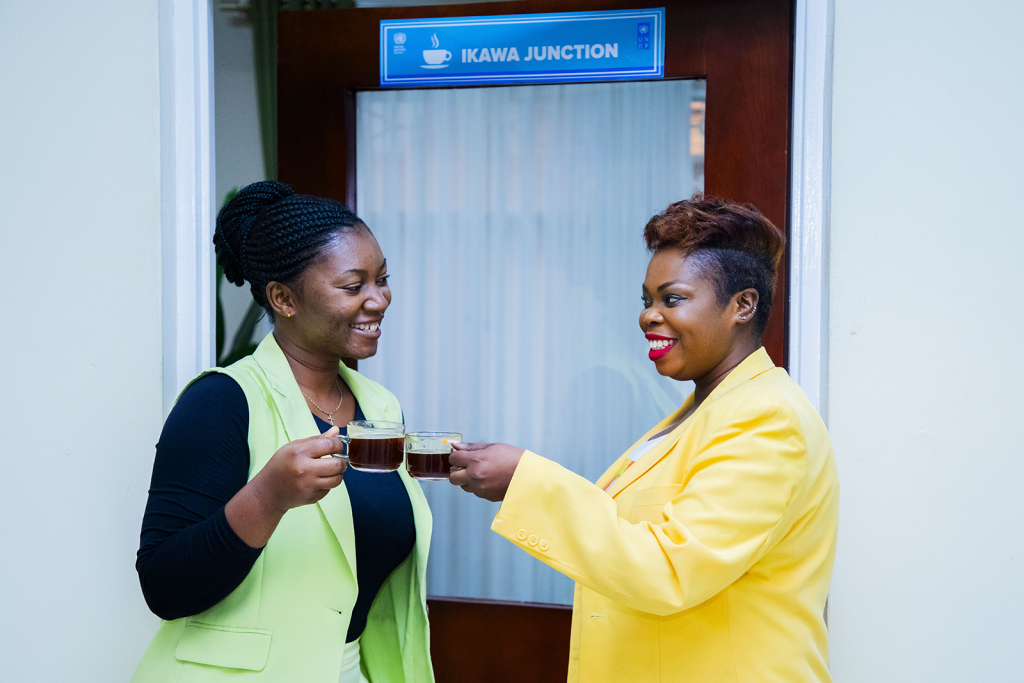Photo credit: Adwoa Kondu-Yiadom
By Adwoa Kondu-Yiadom, MIPP student
As I approach the six-month mark of my volunteer journey with the UNDP in Rwanda, I can’t help but feel a sense of nostalgia. It has been a joy stepping into the UNDP office each day. A place where individuals from diverse backgrounds unite under a common goal, and I am proud to be a part of this team.
Right at the entrance, the air carries an invigorating scent of freshly brewed Rwandan coffee from the UNDP’s brand-new coffee-drinking hub, “IKAWA Junction.” This hub is where staff gather, exchange ideas, and create a morning ritual that goes beyond just having caffeine. Here, colleagues from diverse backgrounds come together, and the sounds of Kinyarwanda, English, and French blend together in perfect harmony. We exchange greetings-Muraho, Bonjour, Hi- and our shared commitment to sustainable development bridges linguistic gaps while we work together seamlessly to achieve our goals.
As my role as a fellow Resource Mobilization Specialist comes to an end, I proudly reflect on my diverse and impactful contributions to the UNDP Country Office.
Drawing on my expertise in journalism, communications, and public policy, I took the lead in the UNDP’s resource mobilization efforts, playing a crucial role in several initiatives. One of the highlights was a training program I led for 30 journalists, focusing on disability-inclusive reporting. This experience not only deepened my understanding of media dynamics in Rwanda but also allowed me to share my knowledge with local journalists.
My journey with UNDP has been transformative, fostering both personal and professional growth. I have shared more of my journey in previous blogs, and in this final piece, I want to give you a bit of an inside look at the magnificent East-African country of Rwanda.
Rwanda is a country that boasts a vibrant culture, breathtaking landscapes, and dynamic socio-economic activities. Kigali, the capital city, is a testament to the country’s resilience and progress. The city’s blend of traditional and modern architecture, clean streets, bustling markets, and vibrant nightlife is a sight to behold. It’s a city that never sleeps, yet it maintains a sense of calm and order unparalleled in other urban centers.
During my stay, I have had the chance to visit all four provinces (North, South, East and West) of the country and some profoundly enlightening sites, from genocide memorial centres to business areas. All these experiences have been both professional and personal, enriching my understanding of Rwanda’s history and culture.
One such trip is my visit to Lake Kivu, which lies on the border between Rwanda and the Democratic Republic of Congo. The tranquil waters of the lake, surrounded by hills, create a picturesque setting that is both captivating and serene. The border between DRC and Rwanda is a hub of activity, with hundreds of people crossing daily, carrying goods for trade. The trade activity is a testament to the strong economic ties between the two countries and the resilience of the people who live along the border.
Although it was a personal trip, I got to appreciate the work that leaders and partners like UNDP’s do collectively to strengthen peacebuilding and social cohesion by deepening economic integration through increased cross-border trade. It served as a reminder of the transformative power of our work, highlighting its profound impact on the lives and communities we serve.
My volunteer journey with UNDP Rwanda has been a rewarding experience filled with discovery, learning, and professional and personal growth. I’m thankful for the opportunity to contribute to the organization and for the support of my supervisor and colleagues in the Transformational Governance unit and the entire UNDP Rwanda country office. This experience has deepened my dedication to sustainable development and reignited my sense of purpose as I strive to positively impact the world.
The opinions expressed in this article are those of the author(s) and do not necessarily reflect the views of the BSIA, its students, faculty, staff, or Board of Directors.
